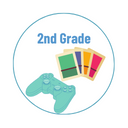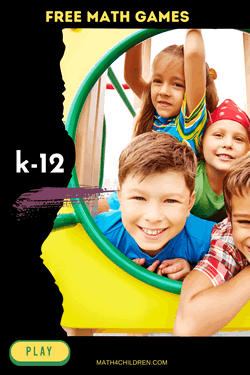Free Math Games | Maths is Cool Games | Cool Games With Math | Cool Math Games Unblocked
Cool math games unblocked are a great way for students to practice and improve their math skills in a fun and engaging way. There are a variety of online math games available that cover a range of math concepts, from basic arithmetic to more advanced topics such as algebra and geometry. These games can be played individually or with a group, making them a perfect activity for the classroom or at home.
Free math games online for children to review varied skills in a fun way. Our games are interactive and fun. Cool games with math: Multiplication Games | Addition Games| Subtraction Games | Telling Time Games | Fraction Games | Math Games on ABCya | collmathgames | Classroom 6x games |
Kindergarten Math Games

Play free preschool and kindergarten math games for kids. Fun math activities for kindergarten
Go to page1st Grade Math Games

Math games for 1st grade students to play games and practice different math topics. cool games with math
Go to page2nd Grade Math Games

2nd grade math games for kids to play and practice math problems. Maths games for 2nd class
Go to page3rd Grade Math Games

3rd grade math games for kids to play and practice math problems. Maths games for class 3
Go to page4th Grade Math Games

4th grade math games for kids to play and practice math problems. Fun math activities for 4th graders
Go to page5th Grade Math Games

5th grade math games for kids to play and practice math problems. Cool math games for 5th graders
Go to page6th Grade Math Games

6th grade math games for kids to play and practice math problems. Math jeopardy 6th grade.
Go to page7th Grade Math Games

7th grade math games for kids to play and practice math problems. Math games for grade 7
Go to page
Fun for math games | Games math free
This page features a collection of free math games by grades. Children will learn math in a fun way through the medium of games like: memory games, crocodile games, matching games, car race games, pirate games, dinosaur games, zombie games and more. Each game is interactive and fun. At the end of each game students can instantly check their perfomance. These games can be played as classroom games or as supplementary homeschooling materials which parents can readily use. Have you ever been drawn into a world of crocodiles and asked to find your way home while trying your luck with the random outcome of a dice? If not, try out our crocodile games. But you may be a pirate game fan, car race fan or any other game type; we have it all on this website. Have fun playing while learning with our cool math games.
 The games on this page are varied. As you click on each link, you are taken into a world of activities that are based on the given game theme. Let’s see what each game is about in brief -
The games on this page are varied. As you click on each link, you are taken into a world of activities that are based on the given game theme. Let’s see what each game is about in brief -
This is the century’s old board game which children play in their spare time using a dice and a board that contains snakes and ladders. Each time a player rolls the dice, they get the chance to move places forward until they get to a final destination. However, getting there is not as easy as it sounds, there are snakes that could swallow you and take you back to start. Snakes and Ladders is a popular board game that has been enjoyed by children for centuries. While it is primarily a game of chance, it can also be used as a tool to teach math to kids. One way that Snakes and Ladders can be used to teach math is by helping children to understand basic concepts such as counting, addition, and subtraction. As children move their game pieces along the board, they can practice counting the number of spaces they have moved and adding or subtracting the number of spaces they have moved to their current position on the board. This can help children to develop their basic math skills and improve their ability to perform basic math calculations. Another way that Snakes and Ladders can be used to teach math is by helping children to understand more advanced concepts such as probability and probability distribution. As children play the game, they can learn about the probability of landing on certain spaces on the board, and how this probability is influenced by factors such as the number of dice rolls and the number of spaces moved. This can help children to develop their understanding of probability and how it is used in the real world. In addition to helping children to understand basic and advanced math concepts, Snakes and Ladders can also be used to teach children important social skills such as taking turns and following rules. As children play the game, they can learn to respect the rules of the game and to take turns in a fair and orderly manner. This can help children to develop their social skills and to learn how to interact with others in a positive and respectful way. Overall, Snakes and Ladders is a fun and engaging board game that can be used to teach children a wide range of math and social skills. By playing the game, children can develop their math skills, improve their understanding of probability, and learn important social skills such as taking turns and following rules. Whether played at home or in the classroom, Snakes and Ladders is a valuable educational tool that can help children to develop a strong foundation in math and social skills.
Math Zombie Games:
Math Asteroid Games
This game is based on the concept of objects falling from outer space back to Earth. If these objects reach Earth before your strike them, they may cause a lot of damage. What students are expected to do to save the planet is to answer as many questions as possible correctly in order to delay the asteroid on its path to Earth. The game is quite fun and speed is everything. You may not end up beating the asteroids but you may delay their impact on Earth. The ultimate goal is to solve as many problems as possible and earn a lot of points at the end of the game. This game can be played in the classroom as a group game or at home as an individual review test. Have fun saving the Earth.
Math wheel of fortune games
The idea of a wheel of fortune is known to most of us. Basically, it is about spinning a wheel and earning points. In a casino, these points translate to money. However, in the current game, children spin the wheel and solve math problems in order to earn these points. The reward goes to the player or team that gets the most points at the end of the game. This is modulated by how many math problems you solved and got right. This game is so much fun and can be played by an individual or in a group.
Games free math | games maths free | math games that are free |
Math Games U.K. - Year 1 | Year 2 | Year 3 | Year 4 | Year 5 | Year 6 | Year 7 | Year 8
U.S. - Kindergarten | 1st Grade | 2nd Grade | 3rd Grade| 4th Grade| 5th Grade | 6th Grade | 7th Grade | Jordans's Math Games
Websites for math games
There are several websites for math games out there, however some only focus only on providing free math games and hardly include any other resources. We have gone beyond games to include other activities like printable worksheets, online quizzes (without a game integrated), puzzles, flashcards, blogs and more. Our games are also of a wide variety and we are committed to constant updates on the latest game concept out there. With your support, we figured out the trends that teachers and parents love and your feedback enabled us to come up with this rich collection.
With the death of adobe flash, we had to make a quick shift and come up with HTML5 game versions that are compatible for mobile devices and across all web browsers. We have not completed the process yet; work is still in progress on recreating the exact game templates that existed before. So far, a lot of topics have been covered for each grade and our users are liking it.
Why we focus so much on math games is because math is a subject that most people struggled or still struggle with. Although we had a chance to avoid the subject completely at some stage, it is impossible when you have kids. Your level of weakness in the subject gets even worse over time and you may be surprised how quickly your kids have improved over time. It makes teaching them very difficult in turn. Given this situation, you may end up unconsciously discouraging your kids from loving this subject which is actually quite fun.
Our goal is to help parents through this huddle, by providing them with free alternatives of teaching math in a way that increases the interest in the subject. Children are not only playing math games here, but are also solving math problems. This combination is great for homeschooling kids as well as for boosting the excitement in a math classroom.
In future we are considering delivering customized games for schools and educators at large. How this will work is, a parent or school may contact us for custom games on any math topic. Based on the resources we have in terms of templates; we shall go ahead and create these activities and host them on this website. Once this is done, we shall share the link with whoever made the request.
We are also going to append other resources to our games. On this website as mentioned earlier, there are worksheets and puzzles to complement exercises on each topic. One thing we are also doing, is creating a robust math video platform through our KidsMathTV YouTube channel. It is worth noting that our games are more or less like quizzes that test skills already learned. If you don’t master these skills yet, it makes sense to head over to the videos on YouTube and select the topic you need to study. Afterwards, take a test to further improve and consolidate math skills learned.
Based on our future and current projects, we are being listed among the top ten best websites for math games that are free. Keep coming back and also remember to share our content.
Why Math Games Are Great For Kids
Math games are a great way for kids to learn and have fun at the same time. Not only do they help children practice and reinforce their math skills, but they also encourage critical thinking and problem-solving abilities. One of the benefits of math games is that they can be tailored to a child's individual needs and abilities. This allows kids to learn at their own pace and helps to prevent frustration. Math games can also make learning math more interactive and engaging, which can be especially helpful for kids who struggle with traditional methods of math instruction. Another reason why math games are great for kids is that they can help to build confidence. As children master math concepts and win at math games, their self-esteem and confidence in their math abilities will grow. This can be especially important for kids who struggle with math, as it can help to change their negative attitude towards the subject. Math games can also be a fun way for kids to learn and practice math skills with their friends and family. By playing math games together, children can learn social skills such as taking turns, following rules, and working as a team. Overall, math games are a great way for kids to learn and practice math skills in a fun and engaging way. They can be tailored to individual needs, build confidence, and provide an opportunity for social interaction. So next time you're looking for a way to help your child practice their math skills, consider trying out some math games!
Why use math games in the classroom
As a teacher, it is important to make learning fun and engaging for your students. One way to do this is by incorporating math games into your lessons. Math games not only make learning math more enjoyable, but they also have numerous benefits for student learning and development. First and foremost, math games make it easier for students to understand and retain math concepts. When students are having fun, they are more likely to pay attention and be engaged in the lesson. This creates a more positive learning environment, which leads to better understanding and retention of the material. Math games also encourage problem-solving and critical thinking skills. Many math games require students to think creatively and use their reasoning skills to solve problems. This helps to develop these skills, which are essential for success not only in math, but in other subjects and in life. In addition, math games can be used to differentiate instruction and cater to the needs of all students in the classroom. For example, if you have a student who is struggling with a particular concept, you can provide them with a math game that is geared towards reinforcing that concept. This allows the student to work on the concept at their own pace and in a way that is enjoyable for them. Furthermore, math games can be used to introduce new concepts in a low-stress environment. Many students get anxious when they are faced with new material, but by using a math game to introduce a concept, you can take away some of that anxiety and make the learning process more enjoyable. In conclusion, incorporating math games into the classroom is a great way to make learning math more enjoyable and effective. Math games encourage problem-solving and critical thinking skills, cater to the needs of all students, and can be used to introduce new concepts in a low-stress environment. As a teacher, it is worth considering incorporating math games into your lessons to enhance student learning and engagement.
Variations of Math Games With Dice
There are several variations of math games with dice. In each one, the player must write the equation on the rectangle that is covered by his roll. If he succeeds, he wins. If he fails, he must start over and roll again. A winning player is the one who covers the largest area in the rectangle.
Variations of math dice games onlineIf you're looking for a fun way to learn math, consider playing variations of math dice games. These games require your child to compare sets of two numbers and decide when to keep the pair and re-roll the dice. Some of them are simple and easy to play, but others require more strategy and planning.
Some variations include multi-step dice. Here, players roll two dice and mentally add or subtract them, resulting in a number that adds up to 100. A player can choose to roll two green dice, one blue die, or a combination of both. The winner is the player who gets the closest to 100.
Dice games are a fun way to practice basic math skills, and they help students spot patterns and shortcuts in equations. They are also inexpensive and easy to find at the dollar store. Generally, you will need a few dice, pencil, and a piece of paper with numbers and a mountain drawing. Each player takes a turn rolling the dice, and whoever has the highest total wins.
Math dice games can also be fun ways to help kids explore probability and other related concepts. Students can use any dice to play, from regular six-sided ones to dice with more sides. They also provide opportunities to measure student learning and differentiate instruction.
Set up a gameA game can be played in pairs and can involve a number grid. Each student will need two dice and a pencil. The goal of the game is to make the largest number possible by rolling the dice. Then, students will place the numbers on the grid. The person who rolls the largest number wins! This game also teaches students to compare numbers using addition, subtraction, and multiplication.
Another game to play with dice is called area. All you need are two dice, graph paper, and colored pencils. Each player rolls a pair of dice and has to write down the number that is rolled on the graph paper. The player who comes closest to the correct number wins the round.
Math dice games can also be played anywhere, making them a great way to learn math facts. A fun game to play with children will engage them in the learning process while developing their critical thinking and communication skills.
Other Dice Game IdeasDice games can also be used for storytelling and problem solving. You can take turns narrating a story, and then pause so others can pick up the story mid-story. Alternatively, you can use dice to ask questions. You can also research questions and brainstorm using the number that you roll.
Another great game to start playing with dice is 'Roll & Cover'. The idea is simple: roll two dice, and see which number is higher. If that number is higher than the others, they roll again, and so on. The player who rolls the highest number wins both dice. If they roll more than twice, they move to the middle. If they don't win, they lose all points for that round.
Benefits of memory games in early childhood
Memory games are a type of educational activity that can be incredibly beneficial for children in their early years of development. These games are designed to help children improve their memory skills, concentration, and overall cognitive abilities. In this essay, we will explore some of the key benefits of memory games for early childhood and how these games can help children learn and grow.
One of the primary benefits of memory games for early childhood is that they help to improve memory skills. Memory is a crucial cognitive function that enables us to retain and recall information. It is essential for learning and problem-solving, and it is something that we use every day. Memory games help children to improve their memory skills by providing them with a fun and engaging way to practice recalling and remembering information. These games often involve matching or matching objects, which helps children to learn how to associate and remember specific pieces of information.
Another benefit of memory games for early childhood is that they help to improve concentration. Concentration is the ability to focus on a task or activity for an extended period, and it is an essential skill that children need to learn. Memory games can help to improve concentration by providing children with a specific task or activity to focus on. For example, memory games may involve matching objects or cards, which requires children to pay close attention to the details of the objects or cards. This helps children to develop their concentration skills, which can be beneficial for learning and problem-solving in other areas of their lives.
In addition to improving memory and concentration, memory games can also help to improve overall cognitive abilities. Cognitive abilities refer to the mental processes that we use to think, learn, and remember information. These processes include things like attention, perception, reasoning, and problem-solving. Memory games can help to improve cognitive abilities by providing children with an engaging and stimulating way to practice these skills. For example, memory games may involve matching objects or cards, which requires children to use their observation skills and problem-solve to figure out which objects or cards go together. This can help children to develop their overall cognitive abilities, which can be beneficial for learning and problem-solving in other areas of their lives.
Memory games can also be an excellent way for children to learn new concepts and information. Many memory games involve teaching children about specific topics or subjects, such as animals, colors, shapes, or numbers. By playing memory games, children can learn about these concepts in a fun and engaging way, which can help to make learning more enjoyable and effective.
Another benefit of memory games for early childhood is that they can help to improve social skills. Many memory games involve playing with others, whether it is with a group of friends or with a parent or caregiver. This can provide children with an opportunity to interact with others and practice social skills, such as communication, cooperation, and turn-taking.
In conclusion, memory games are a fantastic educational activity for early childhood that can provide numerous benefits for children's learning and development. These games can help to improve memory skills, concentration, cognitive abilities, and social skills, and they can also be an excellent way for children to learn new concepts and information. Overall, memory games can be a valuable tool for helping children to learn and grow in a fun and engaging way.
Disadvantages of using games in teaching mathematics
Using games in the classroom can be a fun and engaging way to teach students, particularly in subjects like mathematics where some students may struggle with traditional methods of learning. However, there are also several disadvantages to using games as a teaching tool in mathematics that educators should consider. One disadvantage is that games can be time-consuming. Even though they may be effective in engaging students, they can also take up a lot of class time that could be used for other activities. This is especially true if the game requires a lot of setup or explanation, or if it is a longer game that takes a significant amount of time to complete. This can be frustrating for students who prefer more traditional methods of learning, as well as for teachers who may feel like they are not able to cover as much material as they would like due to the time spent on games. Another disadvantage of using games in the classroom is that they may not be suitable for all students. Some students may struggle with the game format, whether it be due to physical limitations, learning disabilities, or simply a lack of interest in playing games. These students may feel left out or disadvantaged if they are unable to participate in the game, which can lead to frustration and a lack of engagement in the lesson. Additionally, some games may not be directly related to the material being taught, which can lead to confusion or a lack of understanding for students. While games can be a fun way to reinforce concepts, they should not be relied upon as the sole method of instruction. It is important for teachers to balance the use of games with more traditional methods of teaching, such as lectures and written assignments, in order to ensure that students have a well-rounded understanding of the material. Finally, games can be expensive, both in terms of the initial cost of purchasing the game and the ongoing costs of maintaining and replacing it. This can be a significant disadvantage for schools or teachers with limited budgets. Overall, while games can be a valuable and engaging teaching tool in the classroom, they should be used with caution and consideration of their potential disadvantages. It is important for teachers to carefully evaluate the potential benefits and drawbacks of using games in their classrooms and to find a balance that works for their students.
The benefits of using educational games to help children
IntroductionThe use of educational games for children has been a popular trend for many years. There are several reasons for this, including the fact that games can help children to develop important skills, such as problem-solving, critical thinking, and creativity. Additionally, games can be an effective way to engage children and encourage them to learn, even when they are not in a traditional classroom setting. In this article, we will explore the benefits of using educational games to help children and why it is so important for parents and educators to consider this approach.
Developing Essential SkillsOne of the key benefits of using educational games is that they can help children to develop a wide range of essential skills. For example, games that require problem-solving can help children to improve their critical thinking abilities. Similarly, games that encourage creativity can help children to develop their imagination and creativity. Furthermore, educational games can also help children to improve their memory and recall skills, which can be particularly useful for younger children who are just starting to learn new information.
Encouraging LearningIn addition to developing essential skills, educational games can also be a great way to encourage children to learn. This is because games are often designed to be engaging and enjoyable, which can make children more motivated to participate and learn. Furthermore, games can also provide a fun and interactive way for children to learn new information and concepts, which can make the learning process much more enjoyable and memorable.
Improving ConcentrationAnother benefit of using educational games is that they can help children to improve their concentration levels. This is because games often require children to focus their attention on specific tasks and objectives, which can help to improve their overall ability to concentrate. Additionally, games can also help children to develop better time management skills, which can be especially important for younger children who may struggle to stay focused on a single task for an extended period of time.
Promoting Social DevelopmentFinally, educational games can also be a great way to promote social development among children. This is because many games require children to work together and communicate effectively in order to achieve a common goal. Furthermore, games can also help children to develop important social skills, such as cooperation, teamwork, and negotiation. These skills can be particularly important for children as they grow older and begin to interact with others on a more regular basis.
Cool Math Games Run: Fun and Educational Games for All Ages
Cool Math Games Run is a popular online platform that offers a wide variety of fun and educational games suitable for all ages. In this article, we will explore the world of Cool Math Games Run, highlighting its unique features, benefits, and the educational value it provides. Whether you're a student looking for a productive way to spend your free time or a parent searching for safe and engaging games for your child, Cool Math Games Run has something to offer for everyone.
The History of Cool Math Games Run
Cool Math Games Run has a fascinating history that dates back to its launch in 1997. Founded by a team of educators and game enthusiasts, the platform was created with the aim of making learning math and science concepts enjoyable and accessible to a broader audience. Over the years, it has evolved into a comprehensive website offering a wide range of games, puzzles, and interactive activities.
Why Choose Cool Math Games Run?
1. Educational Value
Cool Math Games Run stands out for its educational value. Unlike many other online gaming platforms, it prioritizes learning while having fun. The games on the platform are designed to enhance mathematical and problem-solving skills, making it an excellent resource for students of all ages.
2. Age-Appropriate Content
One of the key features of Cool Math Games Run is its extensive library of age-appropriate content. Games are categorized by age group, ensuring that players are exposed to challenges suitable for their skill level. Whether you're in elementary school or pursuing higher education, you'll find games that match your academic needs.
3. Fun and Engaging
Learning through games is not only effective but also enjoyable. Cool Math Games Run offers an array of games that are not only educational but also highly engaging. From logic puzzles to interactive simulations, there's never a dull moment on the platform.
Exploring Cool Math Games Run
4. Math Puzzles and Brain Teasers
One of the highlights of Cool Math Games Run is its collection of math puzzles and brain teasers. These games test your mathematical prowess and critical thinking skills while keeping you entertained.
5. Science Simulations
For science enthusiasts, Cool Math Games Run offers a series of science simulations that allow players to explore various scientific concepts. From physics to chemistry, these simulations provide a hands-on learning experience.
6. Interactive Learning
Interactive learning is at the core of Cool Math Games Run. Players can experiment, make decisions, and see the immediate consequences of their choices, fostering a deeper understanding of the subject matter.
How to Get Started
7. Creating an Account
To access the full range of Cool Math Games Run content, you'll need to create a free account. Simply visit the website and sign up with your email address. Once registered, you can start playing and tracking your progress.
8. Game Recommendations
Upon creating an account, Cool Math Games Run provides personalized game recommendations based on your age and interests. This feature ensures that you'll find games that align with your learning goals.
Conclusion
In conclusion, Cool Math Games Run offers a unique blend of education and entertainment that makes learning math and science a delightful experience. With its age-appropriate content, engaging games, and interactive learning opportunities, it has earned its place as a go-to resource for students, parents, and educators alike.
FAQs
1. Is Cool Math Games Run suitable for all age groups?
Yes, Cool Math Games Run caters to a wide range of age groups, from elementary school students to adults.
2. Are the games on Cool Math Games Run free to play?
Yes, the platform offers a selection of free games. However, there is also a premium subscription option for access to additional content.
3. Can I track my progress on Cool Math Games Run?
Absolutely! Creating an account allows you to track your progress and achievements as you play.
4. Is Cool Math Games Run safe for children?
Yes, Cool Math Games Run prioritizes safety and provides a secure gaming environment suitable for children.
5. How can I get started on Cool Math Games Run?
To get started, simply visit the website and create a free account. You'll be exploring educational games in no time.
Conclusion
In conclusion, the use of educational games for children can provide a wide range of benefits, from developing essential skills to encouraging learning and promoting social development. Therefore, it is important for parents and educators to consider using educational games as a way to support children's growth and development.
Problemas matemáticos | problemas de matemáticas primaria | Problemas matemáticos fracciones | Matematicas juegos divertidos | 2048 cool math games |
Matemáticas en inglés | Juegos de matematicas en linea | Juegos de matemáticas para jardín de infantes | Juegos matematicas preescolar | Mathsspot |










